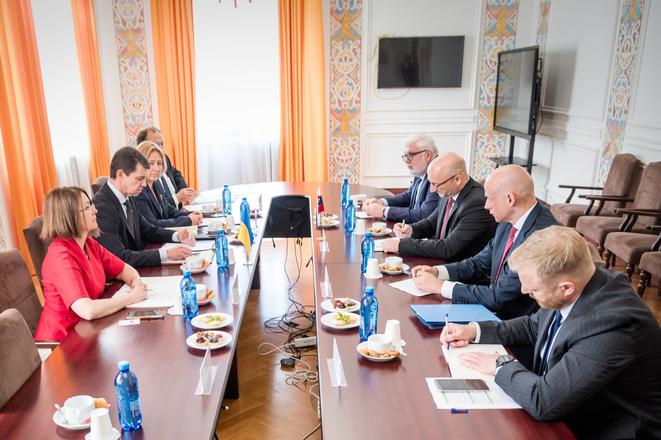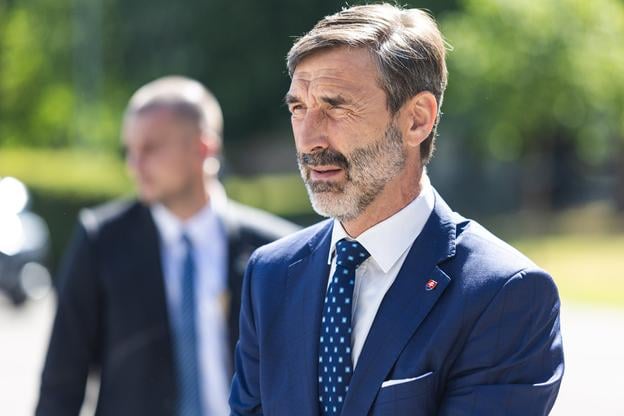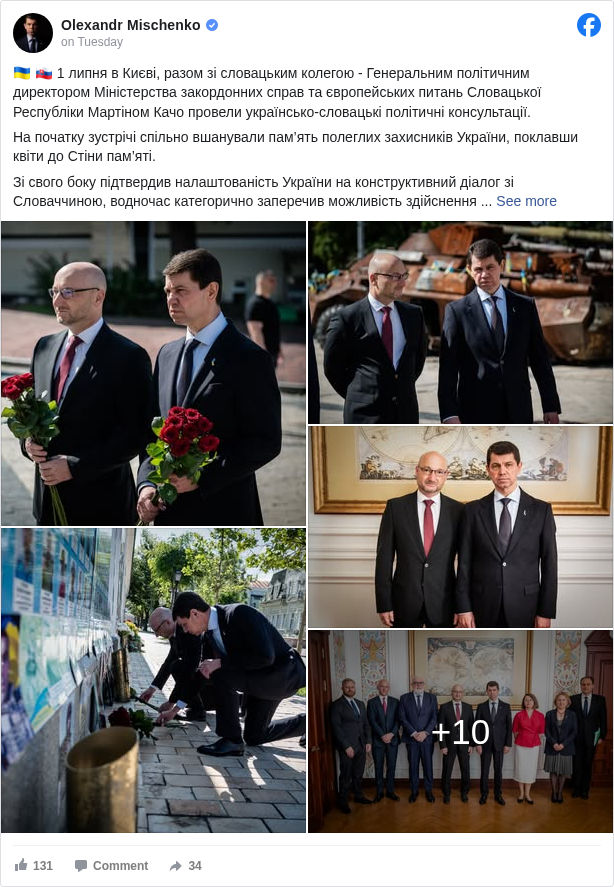Slovakia’s foreign minister has triggered a diplomatic stir after suggesting that peace with Russia may require forgiveness – a statement that drew sharp criticism from Ukraine but has not derailed ongoing cooperation between the two countries.
“We do not want a war to break out between Russia and NATO – that would mean a third world war,” Foreign Minister Juraj Blanár said during a Sunday political debate on Slovak public television. “We want the conflict to be resolved peacefully. We must find a way to cooperate with Russia, and perhaps even forgive everything that has happened. We are against preparations for war, but we cannot simply look away.”
Blanár’s comments were swiftly condemned by Ukrainian Foreign Minister Andrii Sybiha. In a public response, Sybiha said: “Russia’s sense of impunity is the root cause of its crimes. It is naive to expect a criminal to stop if their crime is forgiven instead of punished. Russia will strike your other cheek as well. And those who have lost no one in this war have no right to make such statements.”
Prime Minister Robert Fico attempted to distance himself from the fallout, claiming he was unaware of Blanár’s statement. But he defended his foreign minister, calling him “no parrot” who merely echoes expected opinions.
Fico rebuffs Zelensky meeting
Fico further deepened tensions with Kyiv by dismissing the idea of a bilateral meeting with Ukrainian President Volodymyr Zelensky. “There is no point in me meeting President Zelensky, because he hates me,” Fico said in a Saturday political discussion programme. “He hates me because I dare to have my own opinion on the war in Ukraine. We must begin to communicate at the level of governments.” According to Fico – who has met with Russian President Vladimir Putin twice since the invasion of Ukraine – the only meaningful diplomatic contact would be a meeting with Ukrainian Prime Minister Denys Shmyhal.
Fico also reiterated that Slovakia would not support the European Union’s proposed 18th package of sanctions against Russia, citing economic self-interest. “We would be shooting ourselves in the foot,” he said, referencing the impact of sanctions on Slovakia’s energy-dependent economy.
Slovakia remains heavily reliant on Russian energy imports, including gas and nuclear fuel, despite broader EU efforts to decouple from Russian resources.
Meeting in Kyiv
Despite recent tensions, both Slovak and Ukrainian officials have insisted that bilateral cooperation remains on track. According to Slovakia’s Foreign Ministry, a high-level diplomatic meeting in Kyiv on 1 July reaffirmed shared commitments to humanitarian support, energy security, and efforts to pursue a peaceful resolution to the war in Ukraine.
The meeting brought together senior officials from both sides, including Martin Kačo, political director at the Slovak ministry, Slovak ambassador to Ukraine Pavol Vizdál, and Ukraine’s Deputy Foreign Minister Oleksandr Mishchenko. Talks also included Ihor Brusyl, a senior official in the office of the Ukrainian president.
The two governments are preparing for a third joint session of their respective cabinets later this year, following similar meetings in the Slovak town of Michalovce and the Ukrainian city of Uzhhorod in 2024.
Kačo said that Slovakia remains committed to pragmatic cooperation, including projects under a strategic “roadmap” and energy infrastructure initiatives. Slovakia is also contributing to humanitarian efforts, notably in mine clearance, and is participating in Ukraine’s reconstruction through the Ukraine Investment Framework.
During the talks, the Slovak side voiced support for Ukraine’s bid to join the European Union and praised Kyiv’s stated commitment to negotiating a ceasefire. However, it also raised concerns over energy security, particularly Ukraine’s unilateral decision to halt the transit of Russian gas through its territory.
Kačo said Slovakia’s stance on sanctions remains guided by national economic interests. Bratislava is seeking assurances from the European Commission that proposed measures under the REPowerEU programme will not harm Slovakia’s economy. “Disengagement from strategic raw materials from the Russian Federation may have extremely negative consequences not only for Slovakia but also for the broader European economy,” he warned.
Ukraine urges firmer support
Ukraine, meanwhile, called the decision to end Russian gas transit “irreversible” and urged Slovakia to support the EU’s latest sanctions package and contribute to the establishment of a special tribunal for crimes of aggression against Ukraine.
While Kyiv reiterated its desire for constructive dialogue, it firmly rejected what it described as political pressure through energy diplomacy or “anti-Ukrainian rhetoric”. Kyiv denounced Blanár’s suggestion of forgiveness as “categorically unacceptable”, warning that proceeds from Russian gas transit are fuelling “a criminal war” and that Slovakia should not be complicit in financing it.


 The meeting between Ukrainian and Slovak officials in Kyiv on 1 July 2025. (source: Facebook - Ukrainian Embassy in Bratislava)
The meeting between Ukrainian and Slovak officials in Kyiv on 1 July 2025. (source: Facebook - Ukrainian Embassy in Bratislava)
 Slovak Foreign Minister Juraj Blanár (source: TARS - Daniel Stehlík)
Slovak Foreign Minister Juraj Blanár (source: TARS - Daniel Stehlík)
